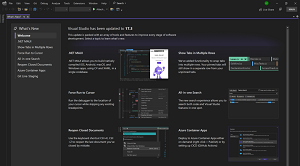News
Visual Studio 2022 17.3 Preview 2 Is First Native Arm64 Release
As promised at the recent Build developer conference, Visual Studio 2022 17.3 Preview 2 is now available as a native Arm64 application on Windows 11.
"We have been steadily building momentum to support our Arm64 developer community, which includes hardware, toolchain, and of course, Visual Studio," Microsoft said during Build. "The Arm64 Visual Studio preview will be publicly available for everyone in the next few weeks."
Typically, the Arm architecture is used to build CPUs for low-power mobile devices, increasingly being used instead of x86-based architectures in larger devices. Arm64 is an extension -- or evolution -- of the ARM architecture that supports 64-bit processing, and Visual Studio 2022 is 64-bit software.
 [Click on image for larger view.] Visual Studio 2022 v17.3 (source: Microsoft).
[Click on image for larger view.] Visual Studio 2022 v17.3 (source: Microsoft).
"This will be the first version of Visual Studio that will natively support building and debugging Arm64 apps on Arm-based processors," said Microsoft's Mark Downie, a senior program manager for the VS team, in June 14 announcement post. "Our key goal with this preview is to introduce and stabilize the most popular Workloads used by developers who are building apps that run on Arm64, and to gather feedback from the community to help us prioritize additional experiences and Workloads as we work toward General Availability (GA) later this year."
With this initial preview launch, enabled workloads include:
- Desktop development with C++ (for MSBuild-based projects)
- .NET desktop development (WinForms, WPF) using both .NET Framework, and modern .NET.
- NET and Web development
Those workloads are expected to reach GA status by year's end as Microsoft pursues its overarching goal to prioritize tools and features to run natively whenever possible and to use emulation only where necessary.
While native C++ developers have been able to target Arm64 for some time, and .NET 6 has always had native Arm64 support, that has been extended to include the old, proprietary, Windows-only .NET Framework, specifically the .NET Framework 4.8.1 runtime and SDK. The .NET Framework will live on in the next major update to Windows 11 and will in the future become available for previous OS versions.
"While this first preview will include Windows Forms, WPF and Web apps, support for Windows App SDK, .NET MAUI, and Universal Windows Platform (UWP) will be available in subsequent previews," Microsoft said.
Those aforementioned native C++ developers will also benefit, as compilers would previously run in an emulated mode when running directly on Arm64 devices. "With today's release, you get access to the new native Arm64 MSVC compiler toolset, including its C++ Code Analysis capabilities, while still targeting all platforms currently supported by MSVC," Microsoft said.
Arm64 developers building WinForms, WPF and native apps can get started by:
- Ensuring they have an Arm64 device with Windows 11
- Uninstalling any prior versions of Visual Studio 2022 from a Arm64 device
- Downloading and installing Visual Studio 2022 17.3 preview 2
Downie noted that Microsoft, at Build, announced Project Volterra to "enable developers to take advantage of the powerful integrated neural processing unit (NPU) to build apps that execute local AI-accelerated workloads." At the time, Microsoft said of Volterra, "As an Arm-powered device powered by the Snapdragon compute platform, it will enable Windows developers to build, test and debug Arm-native apps alongside all their favorite productivity tools, including Visual Studio, Windows Terminal, WSL, VSCode, Microsoft Office and Teams."
This week, Downie alluded to Volterra: "We're thrilled to join our Windows, .NET, and C++ partners in building a vibrant Arm64 developer toolchain. Today we deliver the latest version of Visual Studio that significantly reduces the dependence on x64 emulation. While the capabilities of the x64 emulator have expanded, we know that the very best Arm developer experiences will be supported by tools that run natively on Arm64."
About the Author
David Ramel is an editor and writer at Converge 360.